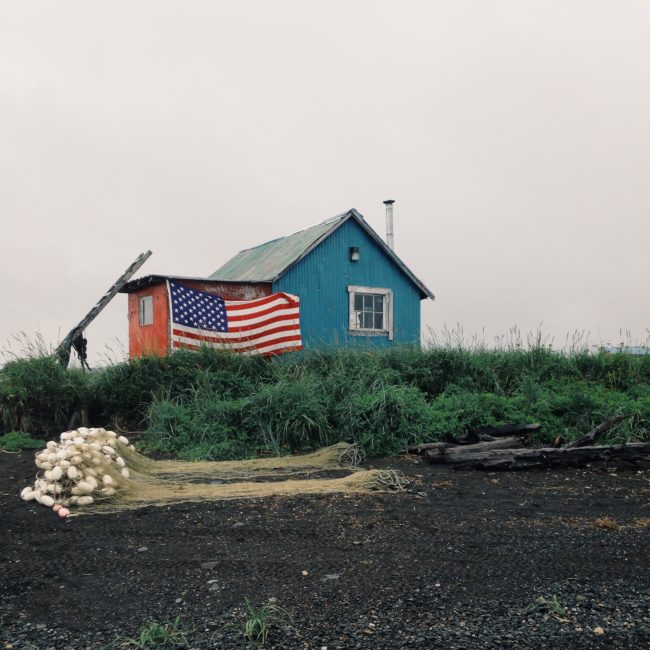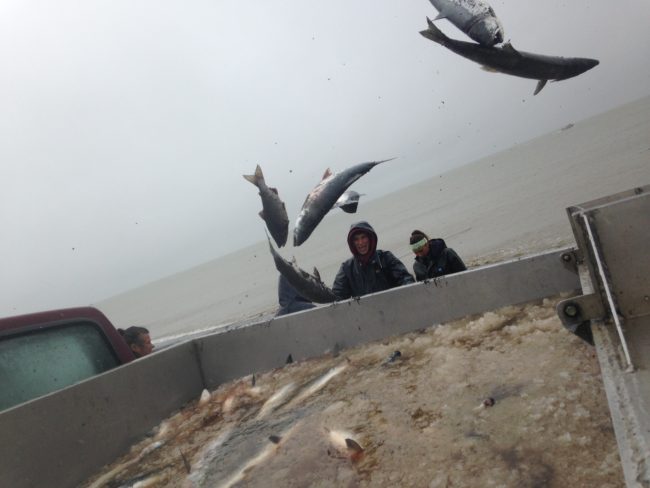
(Photo by Matt Martin/KDLG)
During the summer, the population of Bristol Bay explodes with people from all over the world. They’re looking to play a part in the largest sockeye return in the world. Many of these strangers crew on drift boats or work at a cannery. But there is one beach in the Nushagak Bay that remains a home to local family operations.
Ani White sprinkles rosemary, among other spices, over two whole chickens. She’s preparing dinner for her fishing crew. They’re all taking a quick nap before it’s time to pick the nets again.
“We eat pretty good around here. I like to cook, definitely,” said Ani.
Along with the chicken, fresh green salad and corn on the cob (is) the menu. Ani prepares the meal in one of the half dozen cabins her family owns on Ekuk beach. About 20 other families have similar cabins all along the beach.
There are a few close friends that fish along with Ani but it’s mostly a family operation. Ani is in her midtwenties and lives in Anchorage now but says it’s like a family reunion each summer at the small fish camp.
“During the year, we’re all at different places going to school and so we usually only come together at Thanksgiving, Christmas and then of course, in the summertime for Ekuk and fishing,” said Ani.

Ani is the oldest child and has kind of taken over as head of the camp. Her father, John Bouker, is a pilot in Dillingham. He’s been fishing since the 70s but now that his children are older, for the most part, he lets them do all the work.
“My wife and I keep none of the money. It’s all for these kid’s college and their endeavors,” explained Bouker.
He flew over from Dillingham earlier in the day to drop off some supplies and fix the fridge. He says fishing on Ekuk is unique for Bristol Bay. With satellite TV and nightly steam baths, he says the fishing here is like a vacation, not really work.
“Out here you throw your net out like you see out front, we’re not sitting out in a boat beating around out there,” said Bouker. “Look at those boats beating around out there. That look like any fun? No, I did that when I was a kid, that’s no fun. Those guys ain’t having no fun.”
Ani leaves the chicken in the oven to cook. The tide is on the way out and it’s time to pull the nets. Heavy wind and rains greet this fishing family as they leave their cabins to retrieve their nets from the bay.
While most fishing in Bristol Bay involves around pulling a net over the stern or bow of a boat … Things are done differently here on Ekuk, no boats needed on this beach. A highway of trucks and four-wheelers move up and down the beach. Unlike set net sites on other beaches in Bristol Bay, the fisherman in Ekuk use pickup trucks and a pulley system to drag their nets up out of the water.
“Nikki, help Johna when it’s down here,” said Ani, directing the work from her truck. “She needs help. Somebody, one person.”

(Photo by Matt Martin/KDLG)
Once the net is attached to the winch on the front of the truck it begins to back up and the net slowly slides out of the water. The beds of the trucks have to all be modified to hold a slush of sea water and ice. Their catch goes into that icy brine, and they drive it up to the cannery about a mile down the beach.
Like a lot of fisherman, Ani thought the season was going to be a dud but the late push changed that. She says this time last year they had already packed up all their gear.
“Yeah, we thought we weren’t going to get any fish and here we’re on more fish then we got last season so pretty happy about that,” said Ani.
With fishing out of the way, it’s time to eat that chicken.
“Oh yeah!” exclaimed Ani’s other sister, Nia Bouker, at the sight of the chicken.
“We don’t know if we eat better or if it just tastes better because we work all day,” said Nia.
John Bouker believes having his children do this work is about more than just fish or money. He says the summer fishing work has taught his children discipline and how to plan for the future.
“People don’t think about looking into the future,” said Bouker. “No plan. No plan you might as well be a piece of drift wood drifting around out in the bay. You don’t have a clue we’re you’re going. You’re taken where the current and the wind are going to take you. So you got to have a plan for your children, you know.”
Ani White has a plan. She plans on being back at Ekuk beach each and every summer.
“As long as there is fish, as long as the cannery is open, as long as there is some to buy my fish, I am going to be down here,” said Ani. “So definitely a lifelong Ekuk resident.”
After dinner, the crew heads off to the steam baths before bed. The tide turns early in the morning and another day of fishing will begin.
